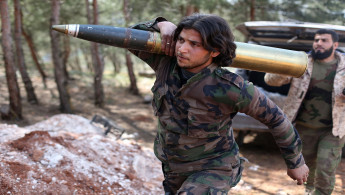Syrian opposition victories bearing down on the regime
In the past several days, the Syrian opposition stepped up its movements on the battlefield along four main fronts in Idlib, Busra al-Sham, Daria, and the Qalamoun, achieving progress steadily against the Syrian regime and the militias fighting alongside it. These developments do not appear to be disconnected from what is happening in the region, which is likely to have an impact in Syria as well.
The Battle of Idlib
A group of Islamist opposition military groups in the countryside, led by al-Nusra Front and the Free Men of the Levant, formed Jaysh al-Fateh [Army of Conquest] comprising 7,000 fighters to capture the city of Idlib from the regime. The battle began several days ago.
| On Friday the opposition took control of the Air Force Intelligence branch in the city and a number of checkpoints. |
Since then, the opposition forces in the Idlib governorate made steady gains, advancing towards the heart of the city of Idlib. On Friday, according to local activists, the opposition took control of the Air Force Intelligence branch in the city, in addition to a number of checkpoints on the northern and eastern entrances of the city, which allowed the opposition to besiege the pro-regime towns of al-Foua and Kefraya and cut them off from the city.
The opposition also continued to advance in the eastern neighbourhoods of Idlib, combing the industrial zone area and taking control of a military barracks and residential compounds near the Mihrab roundabout. This places the regime forces stationed at the roundabout directly in the opposition's range of fire.
The rapid progress achieved by the armed opposition factions in the Idlib governorate indicates there had been preparations and large-scale mobilisations over a period of time ahead of the start of the battle, unlike previous attempts.
The regime's response to the opposition offensive also indicates it is unable to stop the attack, prompting it to resort to using internationally banned weapons and aerial attacks against opposition positions and civilians supporting the opposition. At the same time, it seems retreating from the city is an option the regime may be considering, as it has transferred much of the governorate administration to the city of Jisr al-Shughur.
It seems that the opposition factions, which completed their siege of the city after breaching most regime front lines in a record time, have the ability to advance on the city. However, the opposition factions have other calculations, related to their bid to take the city with minimal losses and instigate defections in the regime that would mean seizing more weapons and equipment. The opposition may also want to minimise civilian casualties.
Multiple fronts
The battle in Idlib is not the only major battle being fought by the opposition. In the south, the opposition launched a major offensive targeting Busra al-Sham in the Daraa governorate. The opposition said it has seized the city, which for a long time served as a staging ground for pro-regime militias' operations in the cities and villages of Daraa.
Daria has also been propelled to the forefront of events, A group of opposition factions mounted attacks there on Lebanese Hizballah and Iranian militias deployed at the shrine of Sayida Sakina, capturing the shrine.
On the Qalamoun front, armed opposition factions seized a number of important positions on Thursday morning previously held by the regime forces and Hizballah, in the eastern mountains opposite the city of Zabadani in the western Damascus countryside.This was seen as a preemptive move in anticipation of the offensive that many reports suggest the regime and Hizballah intend to wage in the spring to control the Qalamoun region and secure the region bordering Lebanon.
| The synchronisation between the battles on the four fronts suggests there is coordination between the opposition factions. |
The synchronisation between the battles on the four fronts suggests there is coordination between the opposition factions, especially as the majority of the factions operating on those fronts are Islamist. Furthermore, the focus of the battles on targeting Hizballah and Iranian-backed militias raises questions in light of Operation Decisive Storm, targeting pro-Iranian rebels in Yemen.
Regional developments
The progress made by the Syrian opposition follows important developments regionally, including the rapprochement between Turkey and Saudi, which could have an important impact on many outstanding issues in the region foremost among them Syria and Yemen.
On March 13, Turkish Prime Minister Ahmet Davutoglu held a meeting with a very broad delegation of the Syrian opposition in Ankara. Given the representation of the opposition delegation, the meeting was seen as an overt message from Turkey that the differences within the opposition were overcome.
Davutoglu made interesting remarks at the meeting, saying his country will not sit idly by vis-a-vis the attacks launched by the Syrian regime along with Iranian-backed militias and Hizballah in Aleppo, Daraa, and the Latakia countryside. Davutoglu stressed Turkey was still seeking a "safe zone" in northern Syria, saying there were meetings underway with US officials to reach a workable plan in this regard.
This is an edited translation from our Arabic edition.



